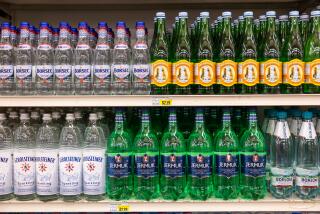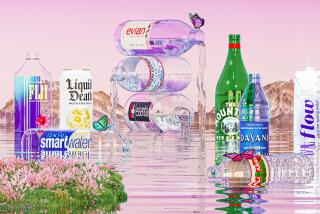A new (watery) addition to the protein group
The recent launch of Kellogg’s new protein water, Special K20, aimed at the general consumer, has some nutritionists rolling their eyes. “Most Americans get plenty of protein through their diet,” says Nancy Clark, a Boston-based sports nutritionist and author of “Nancy Clark’s Sports Nutrition Guidebook.”
Bodybuilders who want extra protein to support and enhance muscle growth have been the primary consumers of high-protein sports products. But even for these athletes, she says, it’s not difficult to add protein to a normal diet.
In the U.S., the recommended dietary allowance for protein is 0.8 grams per kilogram of body weight. For a 150-pound person, this pencils out to about 54 grams of protein. (One simple way to calculate your protein needs is to multiply your weight by 0.4. The number you arrive at is roughly the number of grams of protein your body requires.)
For those seeking to bulk up, about 1 gram of protein per pound of body weight, per day, should be plenty, says Clark, but 0.5 to 0.75 gram is sufficient if the athlete is consuming enough calories.
Based on this formula, “a novice 180-pound bodybuilder gets more than enough protein with 180 grams of protein per day,” she says, citing an example from her online column, “The Athlete’s Kitchen.” “He can easily consume that much with one quart of skim milk, two cans of tuna (i.e., two sandwiches at lunch), and one hefty (8-ounce) piece of chicken, beef or fish at dinner. You could more wisely get the calories from carbs to fuel your workouts.” As a rule of thumb, an ounce of poultry fish or meat has about 7 grams of protein.
Still, there are athletes and others who prefer their protein in water. For this group, we’ve devised a protein water taste test, assembling a crack panel of veteran water drinkers from the Health section to sample four protein waters. All of the products contain protein derived from whey, a milk product.
--
Accelerade
20 fluid ounces/591 ml
Calories: 180
Protein: 9 g
Total fat: 0
Total carbs: 36 g
Sugar: 36 g
Sodium: 290 mg
Potassium: 1% daily value (dv)
Calcium: 2% dv
Iron: 2% dv
Vitamin E: 60% dv
Price: $1.99
Taste: Accelerade has a 4-to-1 balance of carbs to protein, so unlike the other protein drinks tested here, it’s essentially a carb drink with a little protein -- a beverage designed for endurance and recovery rather than building muscle. The peach-mango flavor we tested was considerably more palatable than the others, and in the words of one tester, “more like a drink for grown-ups.”
--
Isopure
20 fluid ounces/591 ml
Calories: 160
Protein: 40 g
Total fat: 0
Total carbs: 0
Sodium: (as citrate) 80 mg
Calcium: 6% dv
Potassium: 1%
Price: $4.19
Taste: The Alpine punch flavor settled on the tongue like a swig of chewy Hawaiian punch. The flavor wasn’t unpleasant, but there was a strong protein-y aftertaste, somewhat reminiscent of a meaty cherry lollipop.
--
Kellogg’s Special K2O
16 fluid ounces/473 ml
Calories: 50
Protein: 5 g
Total fat: 0
Total carbs: 14 g
Dietary fiber: 5 g
Sugars: 6 g
Sodium: 30 mg
Cholesterol: 0
Calcium: 10%
Niacin: 20%
B12/B6: 20%
Price: $1.49
Taste: The mixed-berry flavor was similar to that of cherry Jell-O. It was drinkable but tasted like something a 4-year-old might enjoy after a hard day of heavy lifting.
--
Stacker 2 Protein
Water
19.44 fluid ounces/575 ml
Calories: 80
Protein: 20 g
Total fat: 0
Total carbs: 0
Dietary fiber: 0
Sugar: 0
Cholesterol: 0
Sodium: 20 mg
Potassium: 4% dv
Calcium: 2% dv
Phosphorus: 6% dv
Magnesium: 8% dv
Price: $2.49
Taste: The pink lemonade flavor was refreshing at first, with a tartness similar to real lemonade. Sadly, the pleasant sensation was quickly overtaken by a chemical taste with a soapy finish and rubbery-mouth afterglow.
--
Products were purchased at various retail locations. The price listed for each product was our purchase price.
--


